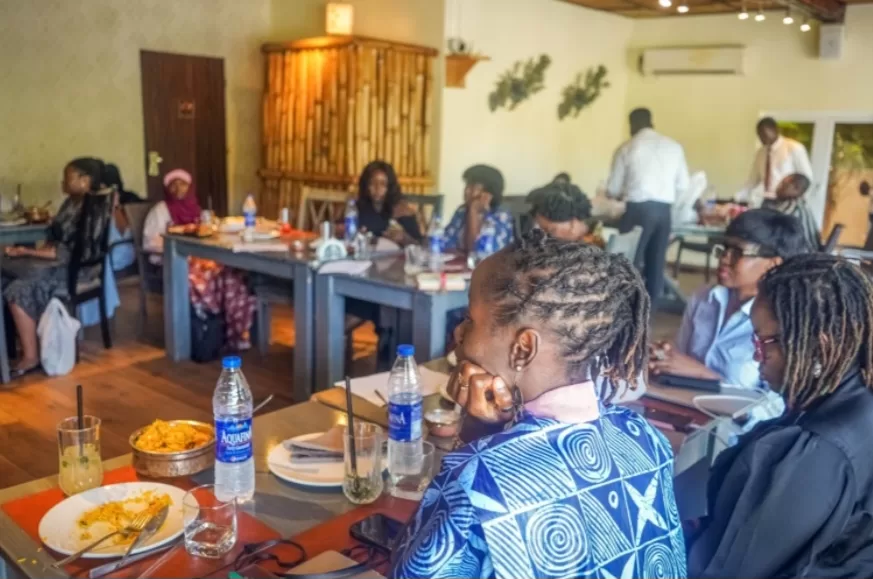To strengthen social accountability in the civic sector, the HumAngle Foundation, a sister organisation of HumAngle Media, held an all-women roundtable discussion on Oct. 30 to address the gender gap in utilising Nigeria’s Freedom of Information (FOI) Act.
The event, which took place in Abuja, North-central Nigeria, had several women advocates and civil society leaders in attendance as they discussed how the FOI Act could be used to hold authorities accountable, focusing on empowering women in the process.
HumAngle Foundation’s Director, Angela Umoru-David, welcomed the attendees and also introduced them to the FOI Act. She noted, “We observed that outside of the FOI requests generated internally, we don’t have any from a female on our FOI platform.”
“Also, we have done a series of radio engagements to spread the word about using this law and in doing so, we received feedback that shows a high level of distrust in the system, even though certain people have not even tried using it yet. This is why we conceived this event: to leverage our networks and ensure more women can participate in demanding accountability.”
In a training session, Hauwa Shaffii Nuhu, HumAngle’s Managing Editor and legal practitioner, guided the participants through the provisions of the law and the procedures for them to exercise their rights to request information effectively and adequately.
“Always ensure you copy the Ministry of Justice and the Attorney-General of the Federation because their office will help implement the sanction,” she told the attendees. “So, as you’re addressing your letter to any organisation, you should ensure that you send a copy to the Ministry of Justice as well.”
“A common misconception is that you cannot ask private offices for records like this; you actually can if they hold public records,” Hauwa added.

On her part, Shade Mary-Ann Olaoye, HumAngle’s Audience Engagement Lead, introduced the HumAngle FOI platform to the attendees, offering a practical demonstration of how the platform can be used in requesting information.
One of the participants, Margaret Fagboyo, Director of the African Center for Leadership, Strategy and Development, highlighted her organisation’s role in advancing the use of the FOI Act, sharing that 26 of Nigeria’s 36 states have now signed the Open Government Partnership (OGP) initiative, backed by the MacArthur Foundation.
The OGP is an international initiative to secure commitments from governments to make their public institutions more transparent, accountable, and responsive to citizens. Launched in 2011, the OGP encourages governments to undertake reforms in public service delivery, access to information, anti-corruption measures, and citizen engagement.
By joining the OGP, states commit to adhering to specific principles of open governance and must develop action plans detailing the reforms they intend to implement.
“Every state has an action plan for implementing FOI,” Margaret added.
Blessing Oladunjoye, Publisher of BO News, shared – through a pre-recorded video- an unusual but commendable experience which highlighted that the sanctions for violating the FOI Act are implementable. She had successfully sued the Yaba College of Technology (YABATECH) for not responding to her FOI request a few years ago. While the case took a couple of years, she was eventually awarded damages by the court.
Lucy James Abagi, CEO at the Public and Private Development Centre (PPDC) was also in attendance. She stressed the role of accountability and transparency in good governance, highlighting that the FOI tool is a tool for that.
At the end of the roundtable discussion, Angela Umoru-David thanked participants for their contributions, stressing that their engagement would be pivotal in shaping a more accountable and transparent Nigeria.
“[This conversation] is not just about us here in these professional, corporate spaces,” she said. “It’s about the regular woman, our aunties, our mothers, our grandmothers. How can we get them to be more involved in conversations like this?”
Participants suggested increasing awareness of the FOI Act through local languages and media, especially radio and called for increased institutional support and political will. Other recommendations included integrating the FOI Act with existing initiatives and lobbying for legislative reforms to strengthen its impact.
The HumAngle Foundation organized a roundtable in Abuja to address women’s underuse of Nigeria’s Freedom of Information (FOI) Act.
Attended by female advocates and civil society leaders, the event aimed to empower women to demand accountability through the FOI Act.
Angela Umoru-David highlighted the lack of female-generated FOI requests, while Hauwa Shaffii Nuhu provided training on effectively utilizing the law. Shade Mary-Ann Olaoye demonstrated the HumAngle FOI platform’s use, and Margaret Fagboyo discussed the Open Government Partnership initiative, urging transparency.
Blessing Oladunjoye shared her success in winning a lawsuit against YABATECH for FOI Act non-compliance, illustrating enforceability.
The gathering emphasized the importance of accountability in governance, with participants calling for increased awareness and legislative reforms to strengthen the FOI Act.
The event concluded with a focus on engaging women from all backgrounds to participate in these accountability conversations.
